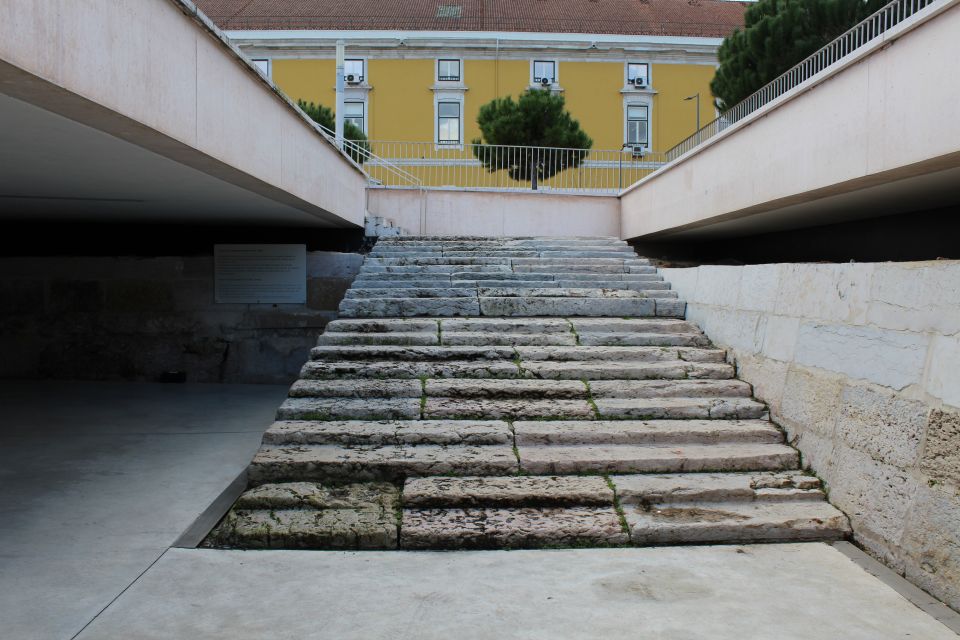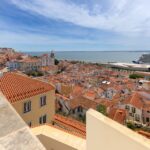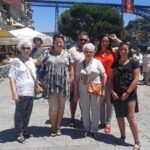Lisbon’s African History and Heritage Walking Tour provides an unparalleled opportunity to uncover the city’s diverse past. Traversing through iconic landmarks, participants can explore the intricate tapestry of African and Portuguese cultures, uncovering the lasting impacts of Africa’s presence in this vibrant capital. From the Moorish roots of the Alfama district to the Praça do Comércio’s central role in the transatlantic slave trade, this immersive experience promises to shed light on the often-overlooked contributions of Africans to Portuguese society. Travelers who embark on this journey can expect to gain a comprehensive understanding of Lisbon’s rich multicultural heritage.
This experience made our list of the 20 Best Historical Tours In Lisbon.
Key Points

- The walking tour explores the African legacy and integration within Portuguese society, particularly in the historic Alfama district of Lisbon.
- The tour covers significant landmarks related to African and Moor history, such as the Chafariz DEl Rei fountain and the Campo das Cebolas, the old port where the first African slaves arrived in Europe.
- The tour provides an opportunity to explore the often overlooked African heritage in Lisbon, including the city’s role in the transatlantic slave trade and the integration of Africans into Portuguese society.
- The tour showcases the intertwining of African and Portuguese cultures, as seen in the architecture, culinary traditions, and religious practices of Lisbon.
- The tour highlights the diverse experiences of African women in Lisbon, including their roles as domestic workers, vendors, and service providers, and their contribution to the city’s vibrant commercial and social fabric.
Walking Tour Overview

Focused on the African heritage and historical interactions between cultures in Lisbon, this private walking tour of the Alfama district offers an immersive exploration of the city’s diverse past.
Over the course of 3.5 hours, guests will discover the African legacy and integration within Portuguese society, visiting landmarks related to African and Moor history.
From the Chafariz DEl Rei fountain, which represents social class divisions in the Middle Ages, to the Praça do Comércio, an emblematic site for the slave trade, the tour provides a comprehensive look at the lasting impacts of Africa’s presence in Lisbon.
Offering a unique perspective on the city’s multicultural heritage, this walking tour is a must for history enthusiasts.
You can also read our reviews of more walking tours in Lisbon
African Roots in Alfama

The Alfama district of Lisbon is deeply rooted in African heritage, with its foundations tracing back to the Moors who once ruled the region.
This historic neighborhood is a fascinating exploration of the intertwining of African and Portuguese cultures.
Visitors will discover landmarks like the Chafariz DEl Rei fountain, which represents the social class divisions of the Middle Ages, including the presence of Africans.
The tour also visits the Campo das Cebolas, the old port where the first African slaves arrived in Europe, and the emblematic Praça do Comércio, a significant site for the slave trade.
These stops offer a powerful glimpse into Lisbon’s complex African legacy and its lasting impact on the city’s history and identity.
First African Slaves in Europe

Campo das Cebolas, Lisbon’s old port, marked the arrival of the first African slaves in Europe, setting the stage for a profound and complex legacy.
This historic site witnessed the beginning of the transatlantic slave trade, a dark chapter that would shape the continent’s future.
As the tour explores, these early African arrivals faced immense challenges, but they also contributed to the rich cultural tapestry of Portugal.
Their influence can be seen in the architecture, culinary traditions, and religious practices that still exist today.
The walking tour offers a rare opportunity to explore this often overlooked aspect of Lisbon’s history, shedding light on the African heritage that’s deeply woven into the fabric of the city.
Slave Trade in Lisbon

Praca do Comercio, Lisbon’s emblematic town square, stood as a central site for the thriving slave trade that shaped Portugal’s colonial history.
During the 15th and 16th centuries, this bustling marketplace witnessed the buying and selling of countless Africans, who were forcibly transported across the Atlantic to serve as laborers in Portugal’s overseas territories.
The square’s prominent location and proximity to the harbor made it an ideal hub for the lucrative slave trade. Merchants and traders would congregate here, negotiating the fates of human beings as if they were mere commodities.
This dark chapter in Lisbon’s past reflects Portugal’s integral role in the transatlantic slave system that devastated African societies and enriched European powers.
More Great Tours NearbyAfricans in Portuguese Society

Africans maintained a sustained presence and integration within Portuguese society, contributing to the country’s cultural tapestry throughout its history.
The Baixa neighborhood showcased the interaction of Africans in Portuguese society, while the Rua Cor de Rosa was a place where African women provided services.
The integration of Africans in the Catholic religion was evident at the Church of S. Domingos.
The tour also explores the creation of African colonies and the overall integration of Africans in Lisbon, highlighting their enduring legacy and influence on Portuguese culture and society.
You can also read our reviews of more historical tours in Lisbon
- Lisbon: History, Stories and Lifestyle Walking Tour
★ 4.8 · 9,556 reviews - Lisbon: Fado Show with Wine in a Historic Venue
★ 4.8 · 1,294 reviews - Lisbon: Daytime or Sunset Boat Cruise with History and Wine
★ 5.0 · 851 reviews - Small-Group Tour From Lisbon to Tomar Knights Templar History
★ 5.0 · 651 reviews - Private Tuk Tuk Tour: Historic District of Lisbon
★ 5.0 · 579 reviews - Lisbon: Guided Tuk-Tuk Tour Along the Historic Tram Line 28
★ 4.8 · 475 reviews
African Women’s Place

On the Rua Cor de Rosa, African women provided various services that contributed to the vibrant commercial and social fabric of Lisbon.
These women found employment as domestic workers, vendors, and service providers, helping to sustain the city’s economy. Their presence in the urban landscape highlights the integration of African communities within Portuguese society.
The tour explores how these women navigated the complexities of their roles, balancing cultural traditions with the realities of life in a colonial capital. Their stories shed light on the diverse experiences of Africans in Lisbon, underscoring the city’s rich multicultural heritage.
This walking tour offers a unique opportunity to uncover the hidden narratives of African women’s contributions to the history and development of the Alfama district.
Integrating Africans in Colonies

As the tour progresses, it explores how Africans became integrated into the Portuguese colonial system, establishing communities and contributing to the cultural fabric of Lisbon’s neighborhoods.
At the Rossio square, the guide explains how Africans created their own colonies, blending their traditions with Portuguese culture.
The integration of Africans into the Catholic religion is highlighted at the Church of S. Domingos, where they found a place to worship and practice their faith.
Through these stops, the tour demonstrates how Africans became a vital part of Lisbon’s society, leaving a lasting impact on the city’s history and identity.
Moors and the Transatlantic Slave Route

The Moorish influence on Lisbon’s history is deeply intertwined with the city’s role as a hub for the transatlantic slave trade, as the walking tour’s stops at the Chafariz DEl Rei fountain and Campo das Cebolas demonstrate.
The Chafariz DEl Rei fountain represents the social class divisions of the Middle Ages, including the presence of Africans, while the Campo das Cebolas was the old port of Lisbon where the first African slaves arrived in Europe.
The tour also explores how the Baixa neighborhood witnessed the integration of Africans into Portuguese society, and how the Church of S. Domingos facilitated the incorporation of Africans into the Catholic faith.
Frequently Asked Questions

What Is the Dress Code for the Tour?
The tour does not have a strict dress code. Comfortable walking shoes and weather-appropriate clothing are recommended, as the tour involves extensive walking. Participants should dress casually and comfortably for the 3.5-hour duration of the private walking tour.
Are There Any Discounts Available for Students or Seniors?
The tour provider offers discounts for students and seniors, though the specific discount amounts are not explicitly stated. Interested parties are encouraged to inquire about any available discounts when booking the tour.
Can the Tour Be Customized to Focus on Specific Aspects?
The tour can be customized to focus on specific aspects. Customers can discuss their interests with the tour provider, who may be able to tailor the itinerary to meet their needs and preferences within the overall tour framework.
Is the Tour Wheelchair Accessible?
The tour is not specifically advertised as wheelchair accessible. However, the company may be able to accommodate wheelchair users by modifying the route or providing necessary assistance. It’s best to inquire directly about accessibility options.
How Do I Get to the Starting Point of the Tour?
To get to the tour’s starting point, the guide will provide detailed directions and meeting location information upon booking the tour. Participants can easily reach the starting point by following the guide’s instructions.
Recap
The African History and Heritage Walking Tour in Lisbon provides an enlightening exploration of the city’s diverse past.
Participants can discover the lasting impacts of Africa’s presence, from the Moorish roots in Alfama to the role of the Praça do Comércio in the transatlantic slave trade.
The tour offers a comprehensive look at the integration of African culture and the contributions of African women within Portuguese society.
You can check availability for your dates here:



























